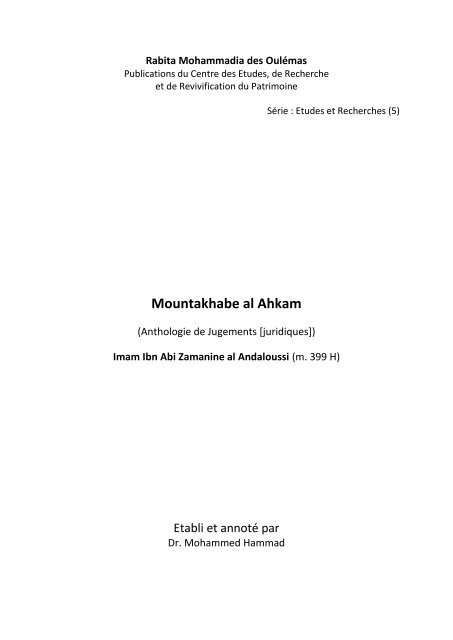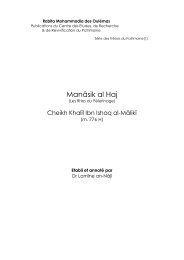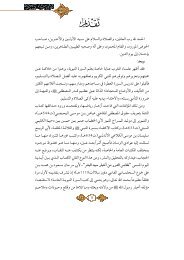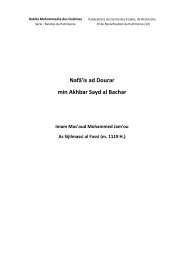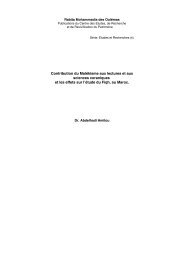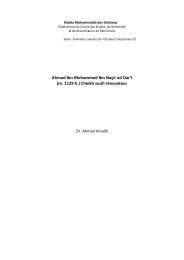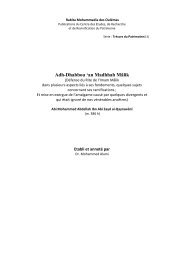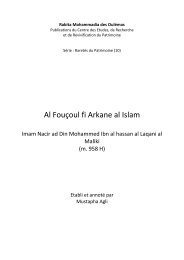Muntakhab al Ahkam
Muntakhab al Ahkam
Muntakhab al Ahkam
You also want an ePaper? Increase the reach of your titles
YUMPU automatically turns print PDFs into web optimized ePapers that Google loves.
Rabita Mohammadia des Oulémas<br />
Publications du Centre des Etudes, de Recherche<br />
et de Revivification du Patrimoine<br />
Série : Etudes et Recherches (5)<br />
Mountakhabe <strong>al</strong> <strong>Ahkam</strong><br />
(Anthologie de Jugements [juridiques])<br />
Imam Ibn Abi Zamanine <strong>al</strong> And<strong>al</strong>oussi (m. 399 H)<br />
Etabli et annoté par<br />
Dr. Mohammed Hammad
<strong>Muntakhab</strong> <strong>al</strong> <strong>Ahkam</strong><br />
(Anthology of [juridic<strong>al</strong>] Judgments)<br />
Imam Ibn Abi Zamanine <strong>al</strong> And<strong>al</strong>usi (d. 399 H)<br />
Introduction and annotation: Dr. Mohammed hammad<br />
Nawazil books are part of the most v<strong>al</strong>uable books that the Faqih<br />
has to consult in order to bring out the Fuqaha method in the deduction of<br />
juridic<strong>al</strong> judgments and the way to apply them according to the diversity of<br />
issues they have to de<strong>al</strong> with. We can <strong>al</strong>so put them to good use in order to<br />
establish the means needed by the Faqih, speci<strong>al</strong>ist in Nawazils, such as the<br />
good knowledge of canonic texts, the acquiring of juridic<strong>al</strong> rules and<br />
inspiration concerning the objectives of law. Thus we can consider this kind<br />
of books as an application of Islamic Fiqh, a fertile soil for creative effort<br />
and the pragmatic Fiqh that we need to revive.<br />
<strong>Muntakhab</strong> <strong>al</strong> <strong>Ahkam</strong>, of Ibn Abi Zamanine (d. 399H) is one of the<br />
most important books that de<strong>al</strong>t with issues and judgments. The book is<br />
divided in 10 parts respectively de<strong>al</strong>ing with disputes, justice, pre-emption<br />
right, possession, marriage, divorce, selling, defects, letting and renting,<br />
and sever<strong>al</strong> others issues. The author extracted texts from the main books<br />
of M<strong>al</strong>ekite Fiqh so that judge finds what he is looking for without having<br />
to do many researches and consultations.<br />
Looking in the history of Nawazils Fiqh writings in the M<strong>al</strong>ekite<br />
School we find that <strong>Muntakhab</strong> <strong>al</strong> <strong>Ahkam</strong> is one of the most important and<br />
the most consulted. Abi Zamanine was, at his time, the most important<br />
Faqih of Cordoba; he was <strong>al</strong>so its Sheikh, its Mufti and the unequ<strong>al</strong>led<br />
lecturer. He was a great connoisseur of the M<strong>al</strong>ekite School, a great Faqih<br />
and was very pious.<br />
Only a few parts of this work have been published so the Patrimony<br />
Reviv<strong>al</strong>,
Research and Studies Centre of the Muhammadan League of Religious<br />
Scholars is proud to publish the entire book which was introduced and<br />
annotated by Dr. Mohammed Hammad who consulted 8 manuscripts. This<br />
work was <strong>al</strong>so Dr. Hammad’s Doctorate thesis<br />
Traduction : Mekaoui Abdélilah
Mountakhabe <strong>al</strong> <strong>Ahkam</strong><br />
(Anthologie de Jugements [juridiques])<br />
Imam Ibn Abi Zamanine <strong>al</strong> And<strong>al</strong>oussi (m. 399 H)<br />
Les recueils de Nawazil (arrêtés) font partie des trésors que le Faqih<br />
doit consulter pour faire ressortir la méthode des Fouqaha dans la<br />
déduction des jugements juridiques et la manière de les mettre en<br />
application en fonction de la diversité des cas qui se posent à eux. On peut<br />
aussi en tirer parti pour déterminer les moyens que le Faqih [spéci<strong>al</strong>iste en<br />
Nawazils] doit avoir, tels que la grande connaissance des textes<br />
canoniques, l’assimilation des règles juridiques, l’inspiration concernant<br />
des objectifs de la loi. Ainsi on peut considérer ce genre de livres comme la<br />
mise en pratique du Fiqh (jurisprudence) islamique, un terrain fertile pour<br />
l’effort créatif et le Fiqh pragmatique que nous avons tant besoin de<br />
revivifier.<br />
Mountakhabe <strong>al</strong> <strong>Ahkam</strong>, de Ibn Abi Zamanine (m. 399 H) est l’un<br />
des ouvrages les plus importants qui ont traité des cas et des jugements. Le<br />
livre est divisé en 10 parties traitant respectivement des litiges, la justice, le<br />
droit de préemption, la possession, le mariage, le divorce, les ventes, les<br />
vices cachés, le louage, ainsi que d’autres questions. L’auteur s’est appliqué<br />
à ressortir les textes des principaux livres du Fiqh m<strong>al</strong>ékite afin que le juge<br />
y trouve ce qu’il cherche sans avoir à faire de longues recherches ou avoir<br />
recours à des consultations.<br />
En considérant l’histoire des écrits sur le Fiqh des Nawazils dans<br />
l’école m<strong>al</strong>ékite, nous trouvons que Mountakhabe <strong>al</strong> <strong>Ahkam</strong> en est l’un des<br />
plus importants et des plus consultés. Abi Zamanine était, en son temps, le<br />
Faqih le plus important de Cordoue ; il en était aussi le Sheikh, le Moufti et<br />
le conférencier sans ég<strong>al</strong>. C’était un grand connaisseur de l’école m<strong>al</strong>ékite,<br />
un Faqih éminent et était d’une grande piété.
Seules quelques parties de ce livre ont été publiées, aussi le Centre<br />
des Etudes, de Recherche et de Revivification du Patrimoine de la Rabita<br />
Mohammadia des Oulémas a l’honneur de publier l’intégr<strong>al</strong>ité de<br />
l’ouvrage, établi et annoté par le Dr. Mohammed Hammad qui en a<br />
consulté 8 manuscrits et dont il a fait l’objet de sa thèse de Doctorat.<br />
Traduction : Mekaoui Abdélilah


